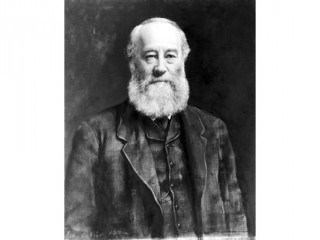
James Prescott Joule biography
Date of birth : 1818-12-24
Date of death : 1889-10-11
Birthplace : Salford near Manchester, England
Nationality : English
Category : Science and Technology
Last modified : 2011-07-19
Credited as : Physicist, brewer, first law of thermodynamics
On Dec. 24, 1818, James Joule was born at Salford near Manchester, the second of the five children of a wealthy brewery owner. A rather frail boy, he received his early education at home. In 1839, in the laboratory in his home, he began his studies of electrical motor efficiency, which ultimately led to his development of the mechanical theory of heat. In connection with this work he became one of the first to realize the necessity for standard units in electricity and to advocate establishing them.
In the course of his efficiency experiments Joule made his first discovery—now known as Joule's law: the heating of a conductor depends upon its resistance and the square of the current passing through it. He presented this important generalization in a paper, "On the Production of Heat by Voltaic Electricity," before the Royal Society in London in 1840.
Joule's study of the interrelation of heat and electrical energy may have stimulated his study of the relationship between heat and mechanical work. His approach was direct: he used the mechanical energy provided by falling weights to heat water by stirring it and made precise measurements of the heat produced and the energy lost by these weights. The results provided the first value of the mechanical equivalent of heat, corresponding to a temperature increase of 1F of 1 pound of water for the expenditure of 838 foot-pounds of work. The apparent simplicity of Joule's experiment is quite misleading, for enormous experimental skill, great care, and limitless patience were needed to get repeatable results; experts regard his work as demonstrating exceptional skill.
Joule presented the results of these mechanical work experiments in a paper, "On the Calorific Effects of Magneto-electricity and on the Mechanical Value of Heat," which he read at the meeting of the British Association in 1843, but no notice was taken of them. During the next 6 years, using variations in procedure, he continued his measurements and consistently substantiated his first results. His reports continued to be overlooked until 1847, when they came to the attention of William Thomson (later Lord Kelvin). He realized their significance, and through his efforts Joule finally got an attentive hearing of his work in 1849, when his paper "On the Mechanical Equivalent of Heat" was read to, and accepted for publication by, the Royal Society. His only other notable work, done with Thomson, led to the discovery of the so-called Joule-Thomson effect in 1862.
Joule remained an isolated amateur scientist for most of his life. After the death of his wife and young daughter in 1853, he lived in relative seclusion. Beginning about 1872 his health deteriorated. He died at his home in Sale, Cheshire, on Oct. 11, 1889.
















